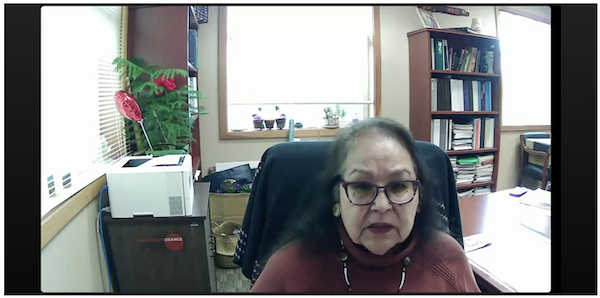
US Senate Panel Hears Siletz, Grand Ronde Fishing, Hunting Bills
Bills to allow two Western Oregon tribes to renegotiate fishing, hunting, trapping and gathering rights agreed to in 1980s’ deals with the state, as well as manage those resources, were considered during a US Senate committee business meeting on the pieces of legislation Wednesday.
The harvesting rights had been sharply limited following establishment by Congress of reservations several decades ago for the Siletz and Grand Ronde Tribes, unlocking federal benefits for their members, but S.3123 and S.3126 would create a process to amend the consent decrees the tribes entered into with the state of Oregon to gain the lands.
“I was on the Tribal Council during this time and I agreed with other Tribal members who believed that this bargain with the State was one made with ‘a gun to our head,'” Cheryle Kennedy, Chairwoman of Confederated Tribes of Grand Ronde, told the Senate’s Committee On Indian Affairs.

Siletz Chairwoman Delores Pigsley described her tribe’s agreement as coming out of the era of the Fish Wars – mostly fought in Washington but the Beaver State was not immune – and made with the support of the Oregon Department of Fish and Wildlife and Oregon US Rep. Les AuCoin, a Democrat who blocked passage of the Siletz’s reservation act in Congress “until ODFW agreed with the extent of Siletz hunting/fishing rights.”
“This ultimately led to Siletz being forced to a near-total extinguishment of its hunting/fishing rights as a condition to obtaining a small reservation,” her testimony states.
Pigsley said the agreement with the state provides her tribe with 200 salmon annually for cultural and/or subsistence needs, along with the harvest of up to 25 elk and as many as 400 deer, if no elk are taken.

The story of the Siletz, who are actually an amalgam of more than two dozen coastal tribes, was told in Charles Wilkinson’s The People Are Dancing Again, published in 2010 and which chronicled how their 1-million-acre, 100-mile-north-to-south 1855 reservation on the Central Coast was whittled away and federal recognition of the tribe was terminated by an act of Congress before being restored by lawmakers in 1977.
Kennedy noted that her tribe’s relationship with the state has “improved dramatically” over recent decades, with ODFW recognizing Grand Ronde as “exceptional” land managers as they work to restore Western Oregon habitat, she said. Their reservation is located between McMinnville and Lincoln City.
The state agency also has a working partnership with the Siletz, as well as other nontreaty tribes throughout the state.
The bills are sponsored by both of Oregon’s US Senators, Sens. Ron Wyden (D) and Jeff Merkley (D), while Oregon Reps. Kurt Schrader (D), who represents the Central Coast and central Willamette Valley, and Suzanne Bonamici (D), who represents Portland and northwest Oregon, introduced similar legislation in the House of Representatives last December.
“It is clear Congress must act so the Confederated Tribes of Grand Ronde and the Confederated Tribes of Siletz Indians finally have a process in place to amend and modernize hunting and fishing agreements that are so vital to their Tribal sovereignty and cultural identities,” said Schrader in a press release at the time. “I look forward to working with Congresswoman Bonamici on this important legislation as a first step toward correcting historic wrongs brought on by harmful consent decrees that were incorporated into the Siletz and Grand Ronde Reservation Acts.”
Echoing an era that’s taking another look at the past, Bonamici called the 1980s’ consent decrees “racist and unjust, and we must right this wrong by passing this legislation to restore their hunting and fishing rights.”
Per Kennedy, the two tribes are the only ones “in the country that are not able to negotiate hunting and fishing issues with the state in which their respective reservations are located.”
According to Kathyrn Isom-Clause, a deputy assistant secretary in the federal Department of Interior’s Bureau of Indian Affairs, once the Siletz and Grand Ronde and state reach new agreements on hunting and fishing throughout the tribes’ “ancestral homelands,” the Senate bills would allow the parties to take them to US District Court for Oregon in Portland to request the original consent decrees be set aside or modified.
Her testimony to the Senate committee indicates that the Siletz consent decree currently includes “limited locations and take amounts for salmon fishing and deer and elk hunting, no special trapping rights, limited gathering rights, and an option to obtain annual amounts of State-furnished salmon, deer, and elk. The consent decree otherwise prohibits Tribal hunting, fishing, gathering, and trapping activities except as authorized under Oregon State law.”
As for the Grand Ronde, their consent decree “provides that Tribal members may fish using Tribal, rather than State, permits in limited geographical areas during State-law fishing seasons, as well as a limited right to hunt deer, elk, and bear in limited geographical areas. The Tribe has no special trapping rights, limited gathering rights, and an option to obtain annual amounts of State-furnished salmon. The consent decree otherwise prohibits Tribal hunting, fishing, gathering, and trapping activities except as authorized under Oregon State law.”
Of note, Oregon law prohibits gillnets on coastal rivers and the Willamette.
Isom-Clause said DOI as well as the Biden Administration support the Senate bills.

Pigsley’s testimony also stated that the Siletz have been in active talks with Oregon and that the tribe believes the state “is supportive of this legislation and allowing a process for Siletz to determine its hunting and fishing rights.”
Governor Kate Brown’s office did not return requests for comment in the immediate wake of the committee meeting, but on Thursday morning spokesman Charles Boyle stated via email, “I can confirm that our office has had conversations with the Siletz Tribe, but I don’t have additional details to provide at this time.”
That leaves unanswered the scope and effect that any new agreements between Oregon and the Siletz as well as the Grand Ronde might have on nontribal fishing and hunting in areas considered to be “ancestral homelands” of the two tribes, with sportsmen left to assume, or at least hope, that in addressing the historical wrong, the Governor’s Office is also protecting their interests and deep connection to the same resources.
The bills need to pass out of committee, both chambers of Congress and be signed by the president before they become law.
